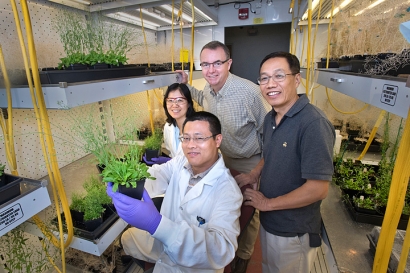
“Plants make their own food,” said John Shanklin, the Brookhaven Lab biochemist who led the research. “They convert sunlight, water, and carbon dioxide into sugars through photosynthesis, and those sugars are usually transported out of leaves to other parts of the plant, and converted to other compounds plants need for growth and development. Oils tend not to accumulate to high levels, except in some seeds.”
In order to tip the balance in favor of higher oil production and accumulation in leaves the scientists needed detailed knowledge of the biochemical processes driving the metabolic pathways and the genes that control them. As described in a paper published in the journal Plant Physiology, the Brookhaven team selectively bred plants to combine a series of traits that blocked some of the sugar transport and conversion pathways, which achieved the desired results.
Earlier research had shown that more sugar in leaves would increase oil production in those vegetative tissues. That work identified how high sugar levels inhibit a regulatory protein that plays a key role in the breakdown of another protein that serves as a switch for turning on oil-production genes. In the current study, the scientists found increased levels of the on-switch protein along with higher levels of oil precursors and oil.
The scientists also bred plants that combined the sugar-increasing traits with other mutations, including one that limited the breakdown of plant lipids, which resulted in further increases in oil precursor accumulation in leaves.
“In several cases, combinations of these mutations helped tip plant metabolism to produce and store more oil than expected in leaves,” Shanklin said.
“Findings from these foundational biochemical-genetic studies provide valuable insights into the relationship between sugar, oil precursors, and oil accumulation in leaves that will help inform biotechnological efforts to optimize oil accumulation in vegetative tissues of economically important plants.”
For information: Brookhaven National Lab
Photo: A Brookhaven Lab research team led by John Shanklin (standing, rear) explored strategies for increasing oil production and accumulation in plant leaves. Zhiyang Zhai (seated, holding plant) carried out the biochemical-genetic studies with technical support from Hui Liu (left) and assistance in data interpretation from Changcheng Xu (right).

